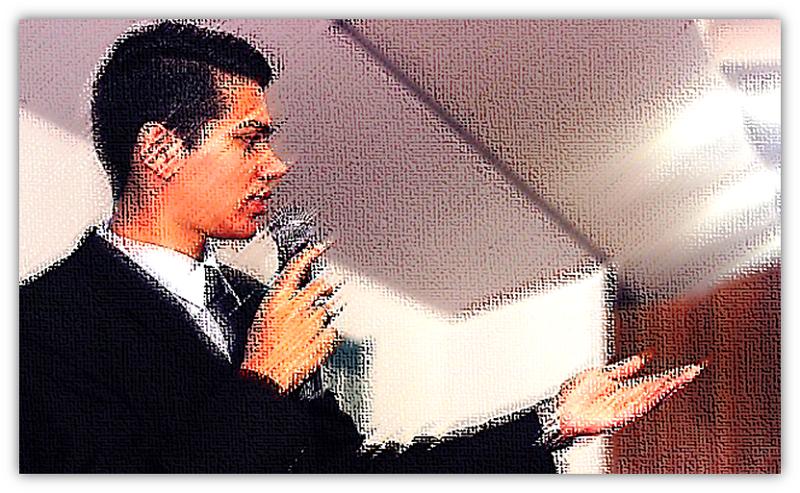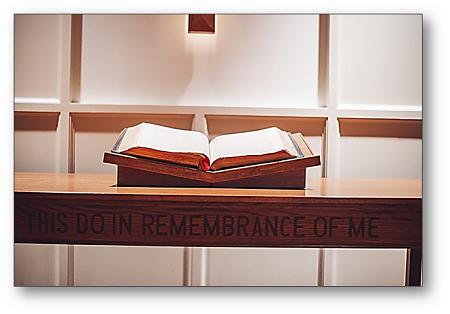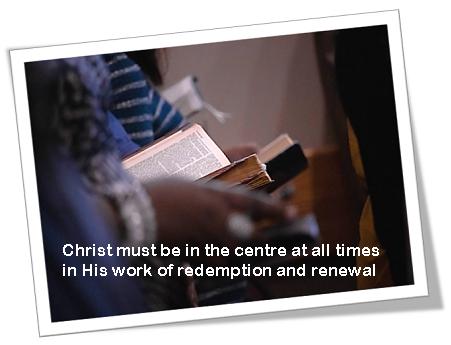The Role of the Preaching in Reformed Liturgy
The Role of the Preaching in Reformed Liturgy

The topic with which we are presently concerned,1 is of great importance and constant relevance to the church. When we speak about the role of the preaching, we are dealing with the central element in the entire worship service. If we take the preaching out of the liturgy, we cut out the heart of the very service of the Lord and we disembowel the church.
On the surface it might seem superfluous to speak about the role of the preaching in a gathering of Reformed people. Was it not the very essence of the great Reformation that the power of the Word of God was rediscovered and the preaching was reinstituted as key moment in the liturgy? For many centuries now the preaching of the gospel has been our forte and strength. Does not the Belgic Confession in Article 29 rightly put forward "the pure preaching of the gospel" as the first mark of the true church? Why would we as Reformed people have to meditate together on the role of the preaching?
Well, there is every reason to do so. The attack on the centrality of the preaching in the liturgy does not cease. Throughout the ages Satan has tried nothing else than to lead God's people away from the glorious liberty of the Word into the bondage of ritualism, symbolism and idolatry. He attempts this also in our time.
Attack on the Preaching⤒🔗
At the beginning of this century, there was in Europe a remarkable "liturgical movement" in the Reformed Churches. This movement, led in the Netherlands, for example, by the Groninger professor Dr. G. van der Leeuw, contended basically that in the Reformed liturgy the preaching had received too prominent a place above the sacrament. As a matter of fact, this movement sought to re-establish the definitive position and constituting character which the Lord's Supper once had in the church. The worship service was seen as being a sacramental occurrence in which the preaching was not allowed to dominate.
This attempt to lead the church back into the "cursed idolatry" of Rome met with much resistance in the Reformed Churches.2 The positive effect of this "liturgical movement" was, perhaps, that it asked more attention for other, neglected parts of the liturgy, but the negative effect was indeed that the central role of the preaching was undermined and an era of liturgical innovation began.
Since the early part of this century, however, a new and greater threat has emerged with respect to the role of the preaching. The "traditional" sermon (and with it the whole idea of preaching) has in the past decades come under much criticism and is today in some "Reformed" circles considered an anachronism, something which has had its time and is now out of date.3
Let us look at some of the statements currently being made about the preaching as we know it. The traditional preaching is considered to be a dull and dreary monologue which no longer functions in this media-oriented age with its fast-paced programming and instant communication. Many churches are steadily losing members and many of the members who stay apparently do not really feel that they are suitably addressed in the preaching. Many sermons just pass most people by as being somewhat irrelevant and entirely impractical. Most preachers seem to be stuck with an ancient form and do not really address the true need and real situation of the hearers.
 ←⤒🔗
←⤒🔗
The Theology of Communication←⤒🔗
Preaching is seen by many today as a "one man show," too much of a monologue, essentially a very subjective and authoritarian form of communication which is no longer effective. Therefore, in an attempt to halt the exodus of disgruntled and uninterested members, many churches are spicing up the liturgy with various alternative activities, more congregational involvement and a general "loosening up." We see this process taking place not only in the (Synodical) Reformed Churches in the Netherlands but also in the Christian Reformed Church in Canada and the United States. And if preaching in general is discredited, especially catechism preaching has become unpopular.
If in the past we have seen various "theologies" emerging, for example, the theology of hope or the theology of liberation, today we see an entire new field, the theology of communication. Anything that does not measure up to scientific standards of modern communication is cast aside as being of no use today for the church of Christ. And behind all this is the basic idea that the Bible itself, written 2000 years ago in another age, has no communicative value today. It is really Scripture criticism which has led also to liturgical experimentation!
We, too, are placed before some of these questions. Do we today still need "preaching?" Is our liturgy not dominated too much by the traditional sermon? Is there an underestimating of the sacraments, particularly the Lord's Supper? Is the preaching today still effective and functional? Are not many sermons indeed dull monologues which lull people to sleep rather than keep them awake?
There are basically two questions here.4 The first question is more general: do we still need preaching? The second question is more specific: are today's sermons adequate and effective? And only if we respond positively to the first question, does it make sense to ponder some aspects of the second one.
The Character of the Worship Service←⤒🔗
We must, also in the light of the above, defend vigorously today both the absolute necessity as well as the lasting centrality of the preaching in Reformed liturgy. The word "liturgy" means service, and it denotes both the contents and the order of the worship service. There can be no liturgy without preaching and in the liturgy the preaching takes in the key position.
We understand this all the more when we look at the character of the worship service. The worship service is nothing less than a covenantal meeting between God and His people.5
This means that it is a special and unique meeting, a holy service, which cannot be compared to any other meeting on earth.
Already in the Old Testament, the LORD gathered His people at the tabernacle and the temple. We find echoed in the Psalms the joy of God's people at being called to this worship, e.g. Psalm 122:1, "I was glad when they said unto me, Let us go to the house of the LORD!" Not only did the LORD provide His people with a specific gathering place, but He also determined a special day, namely the Sabbath, a day of solemn rest, "a holy convocation" (Leviticus 23:3).
This gathering or convocation always had a joyous character and is called in the Bible "an appointed feast." It is a celebration of reconciliation with God through the blood of the covenant, the sacrificial offerings, an enjoying of the peace and prosperity with God which He grants in His grace. This festive character of worship even deepens in the New Testament when the congregation rejoices in the reconciliation brought about by the blood of the one sacrifice of Christ!
The liturgy of the New Testament Church is fully determined by this one, given sacrifice of Christ. Christ is now in heaven as Mediator before God's throne. It has been said that the actual "liturgy" (for "liturgy" means basically the official work of Christ which He performs in the heavenly sanctuary, see: Hebrews 8-10) takes place in heaven.6 That same word "liturgy" now means to us the worship and service as it takes place in the gathering of the congregation.

The Centrality of the Preaching←⤒🔗
In the New Testament worship service, God meets with His people in the new covenant established by the blood of Christ. It is a meeting in Christ, which takes place on the day of His glorious resurrection, by the power of His Spirit.
It is a meeting of two parties, God and His people. There is an experiencing of communion, an exchange of information, an engaging in conversation. We understand, of course, that it is the Lord who initiates this communion. He first calls His people and speaks to them. And the people may respond to His call and His Word in praise and prayer. It is the Lord who through the Word shapes, forms, and receives the believing response of His people!
Already in the time of the Old Testament there was the preaching of the gospel, the teaching performed by the priests and Levites. This tradition became especially accepted after the great Exile in the synagogues. The heart of the gathering in the synagogue was the reading and explaining of Scripture. Christ Himself during His earthly ministry followed this pattern, attending the gatherings in the synagogue, partaking in the reading and teaching of the Word of God.
In the New Testament Church the preaching immediately took in a central place. Already on the day of Pentecost, the signs had to be explained by the Word. The "great commission" which Christ gave to His disciples (Matthew 28:16-20) is one of preaching, sacraments and discipline, in that order, "Go therefore and make disciples of all nations (preaching), baptizing them into the Name of the Father, the Son, and the Holy Spirit (sacraments), teaching them to observe all that I have commanded you (discipline)…"
The meetings of the congregation – indeed the life of the church! – are unthinkable without preaching. The hearts of people are opened by the preaching of the Word (Acts 16:14, the case of Lydia). This is clearly the teaching of the apostle Paul in his letter to the Romans, "But how are men to call upon Him in whom they have not believed? And how are they to believe in Him of whom they have never heard? And how are they to hear without a preacher? And how can men preach unless they are sent?" (Romans 10:14-15). The conclusion there is that "faith comes from what is heard, and what is heard comes by the preaching of Christ" (Romans 10:17).
Worship results from faith. Faith comes through the Word that is preached. Therefore the Word and its preaching take in the central place in Reformed liturgy. The preaching of the gospel is the first and foremost as well as the lasting and remaining task of the church throughout the latter days, as Paul admonished Timothy, "… preach the Word, be urgent in season and out of season, convince, rebuke, and exhort…" (2 Timothy 4:2).
The church has therefore always maintained that the reading of the Word of God and the preaching of the gospel by lawful office-bearers is the heart of worship, the key and central element of the liturgy. It has been called the constituting factor and the continuating factor.7 Only by the divine Word, by the power of God's spirit is the church of Christ built and gathered. How else shall the people respond if not first God speaks?
This is the difference between church and sect, between church and cult. The sect or the cult establishes themselves on human ideas and preferences. Like-minded people gather for their own purposes. Humanistic ideology leads to heathen idolatry. There is no communication from above, no communion with heaven. But the Word and its pure preaching makes the decisive difference between the church of God and the cults of man.
The Purity of the Preaching←⤒🔗
Because the preaching of the Word plays a central and constituting role in the liturgy, it must always be the pure preaching of the gospel. The preaching must be only the administration of the Word. The Holy Scriptures alone are the only source of and the absolute norm for the preaching. Even the catechism preaching is to be fully a summary of the teaching of the Bible.

It is therefore imperative that the ministers of the Word refrain from voicing all kinds of personal opinions on the pulpit, but that they in faithfulness and simplicity bring the gospel of Christ, with its immense comfort and serious admonition. Christ must be in the centre at all times in His work of redemption and renewal. The preaching must be thoroughly Scriptural, Christological and covenantal, week after week. This means that the preachers stick to the text that has been chosen and do not digress into a running social or political commentary.
I am convinced that the loss of membership in many churches – and the general decline of the Reformed Churches in this age – is the result, not of the fact that the preaching is an outdated form of communication, but of the fact that the preaching ceased to be thoroughly Scriptural and truly evangelical. When the Bible was criticized as being irrelevant, the preachers had to take their topics from the world around them, and it ceased to be the authoritative proclamation of the Word of God! Only the pure preaching can and does really build the church of Christ.
One of the prime tasks today of the office-bearers (elders) is to see to it that the preaching remains fully Biblical and functional. Pure and to the point. The preaching is the task of the ministers of the Word. But in this work the ministers should not stand isolated, with their own authority and expertise. This work is under the express supervision of the consistory and subject to the approval of the members who have the office of all believers. Only when these three cooperate in submission to the Word of God will the preaching remain pure and true.
The Preaching in the Liturgy←⤒🔗
Now that we have defined the role of the preaching in the liturgy as being of central significance, we may also speak about the other aspects of the liturgy as well. Preaching is central, but not exclusive. The other elements of the liturgy also have their importance and function. Through the studies of men such as C. Trimp, K. Deddens and G. van Rongen we have again begun to appreciate more the beauty of the entire Reformed liturgy.
The complaint was voiced that the preaching is outdated. The sermon, we heard, is a dull monologue. It is true that the sermon is a monologue, for in the preaching God alone speaks and His people listen! Dr. Trimp has written,
the monological character of the sermon has to do with its contents. The monologue gives expression to the saying 'by faith alone.' Indeed as a monologue, the sermon is a means of grace.8
The sermon is a monologue and we need not apologize for it. Yet we must also understand that the liturgy is a dialogue, a conversation, a communion between two parties, the Lord and His people. The sermon must reflect this as well. The preaching must give evidence of addressing the people within the living context of the covenant with God, in the situation of their own specific needs, and must lead to a response of the people to God!
Through the preaching the Lord seeks the response of His people and there must be in the liturgy room and attention for this response. Liturgy is constituted by the Word of God but it is also consummated by the word (response) of the people of God. Therefore the choice of the psalms and hymns as well as the wording of the prayers is of great importance. The liturgy must be a unity, formed by the Word of God to include the word of the people. And here we must be careful that traditionalism or conservatism does not stifle the lively response of the people.
There is a trend today to seek more congregational involvement in the worship service. Not all of this is wrong. It must indeed be prevented that the service becomes a one man show of the minister, for it must remain an interaction between God and His people. Some more action may very well be encouraged.
Let me give some examples here. It has been convincingly argued now by many respected Reformed scholars9 that the word "amen" is to be said not (just) by the minister but by the entire congregation. Still this is not done in our churches. It has been suggested that the Creed be sung by the congregation or "said in unison."10 Not all churches sing the Creed regularly, let alone that it be said in unison. The Lord's prayer has been explained as a communal prayer, to be said together, and still this is not done in our churches. A case has been made for antiphonal singing (singing in turn),11 but it is not something which can be attempted without calling up immediate resistance. True, we fear a return to Romanist ritualism, but we also tend to resist changes, even if those changes may in a Scriptural sense be for the better and enhance the responsive character of the worship service.

The preaching takes in the prime place and the central position. It plays a key role. But it is not the only thing in the liturgy, and the other elements, such as confession of sin, profession of faith, prayer and praise, need their own accentuation as well. They may function indeed as a keen response to the Word of God, actively involving the entire congregation, young and old. Original Reformed liturgies have stressed this responsive character more than we perhaps do today.
"The Great Assembly Heard"←⤒🔗
Be all this as it may, the fact remains that the preaching of the gospel, as first mark of the church, is the constituting and continuating factor in Reformed liturgy. So it pleases the Lord to speak to His people and to establish and maintain communion with them as the living God through the powerful Word of the Spirit.
The congregation has of old gathered around the open Word to hear what the spirit had to say to the church. This is the lifeline of the church. Here the office-bearers have of old passed on the good news, as David exclaims in Psalm 40, "I have told the glad news of deliverance in the great congregation, lo, I have nor restrained my lips, as Thou knowest, O LORD" (Psalm 40:9), as we sing, "The great assembly heard of Thy trustworthy Word and of Thy steadfast love." Here also lies the strength of the New Testament Church: to hear the true Word of Christ, the voice of the Good Shepherd, and to walk by faith alone until He comes Himself to be with us forever and we may speak face to face.

Add new comment